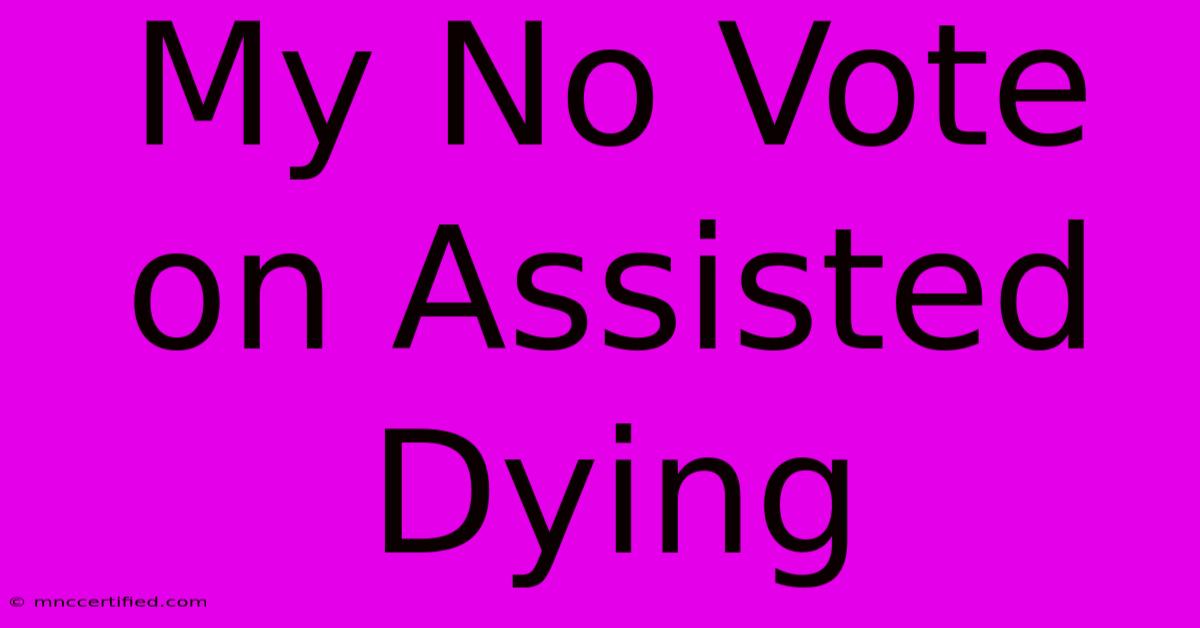My No Vote On Assisted Dying

Table of Contents
My No Vote on Assisted Dying: A Personal Reflection
The issue of assisted dying is deeply complex, sparking passionate debate on both sides. While I understand and respect the perspectives of those who advocate for it, I ultimately cast a "no" vote, and this is my personal explanation. This isn't about a lack of empathy for suffering; it's about a careful consideration of the potential consequences and inherent ethical dilemmas.
Understanding the Nuances of Assisted Dying
Assisted dying, or physician-assisted suicide, involves a physician providing a patient with the means to end their own life. This differs from euthanasia, where the physician directly administers the lethal substance. Both practices raise profound questions about the sanctity of life, patient autonomy, and the role of healthcare professionals. The arguments in favor often center on patient autonomy and the right to die with dignity, especially for those suffering from unbearable pain and terminal illness. Proponents argue that individuals should have the right to choose how and when their life ends.
Concerns Driving My "No" Vote
My concerns are multifaceted and stem from a careful examination of the potential ramifications of legalizing assisted dying:
-
Vulnerable Populations: My biggest concern revolves around the potential exploitation of vulnerable individuals. The elderly, those with disabilities, and those facing financial hardship might feel pressured, either explicitly or implicitly, to choose assisted dying, even if it's not their true desire. Safeguards are difficult to implement and enforce perfectly. How do we guarantee absolute autonomy and prevent coercion? This is a significant hurdle.
-
Slippery Slope Argument: There's a valid concern that legalizing assisted dying, even with strict criteria, could lead to a gradual expansion of its application. What starts as a compassionate act for terminally ill patients might expand to include individuals with chronic illnesses or mental health conditions, who may not have the same level of decision-making capacity.
-
The Role of Healthcare Professionals: Doctors have a Hippocratic oath to "do no harm." Legalizing assisted dying fundamentally alters this core principle, potentially placing immense psychological strain on healthcare providers who may have moral objections. This could affect recruitment and retention within the medical profession.
-
Palliative Care Advancements: Significant strides have been made in palliative care, offering effective pain management and symptom relief for those facing end-of-life. Investing further in these palliative care options is a crucial alternative that should be prioritized before considering assisted dying as a solution.
The Importance of Continued Dialogue
My "no" vote isn't a rejection of compassion or empathy. It's a call for a more nuanced discussion. We need to focus on improving access to high-quality palliative care, ensuring robust safeguards for vulnerable populations, and fostering a culture that supports and values all life, regardless of its stage. This is an ongoing ethical debate that requires continuous critical reflection.
Alternative Solutions and Future Directions
Instead of focusing solely on assisted dying, we need to explore and invest in:
- Improved Palliative Care: Funding and training to ensure everyone has access to the best possible end-of-life care.
- Advance Care Planning: Encouraging open conversations about end-of-life wishes to ensure patient autonomy is respected.
- Mental Health Support: Addressing the underlying mental health issues that might lead individuals to consider assisted dying.
The debate surrounding assisted dying is far from over. My vote reflects my deep concern for protecting the vulnerable and maintaining the highest ethical standards in healthcare. The discussion must continue, focusing on compassionate alternatives and ensuring that all voices are heard. Only through thoughtful dialogue and responsible policy-making can we navigate this complex issue effectively.

Thank you for visiting our website wich cover about My No Vote On Assisted Dying. We hope the information provided has been useful to you. Feel free to contact us if you have any questions or need further assistance. See you next time and dont miss to bookmark.
Featured Posts
-
James Bond Goldeneye Blu Ray
Nov 30, 2024
-
Williamson County Bail Bonds
Nov 30, 2024
-
Black Friday 2024 Deals Live Now
Nov 30, 2024
-
Will Bondo Stick To Aluminum
Nov 30, 2024
-
Broken Bonds Special Edition
Nov 30, 2024